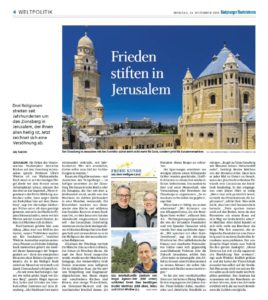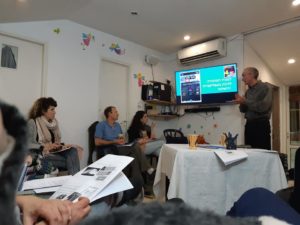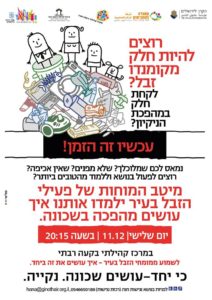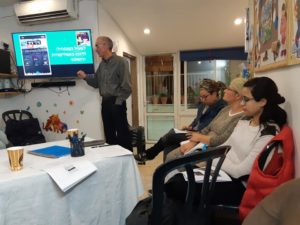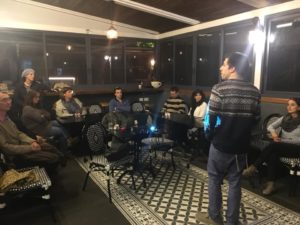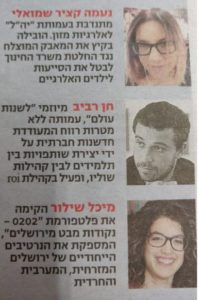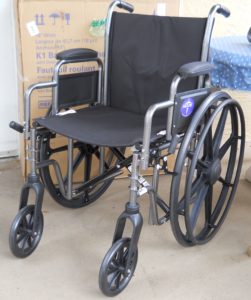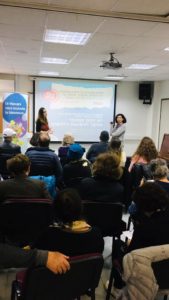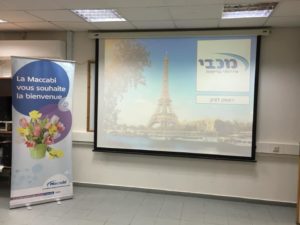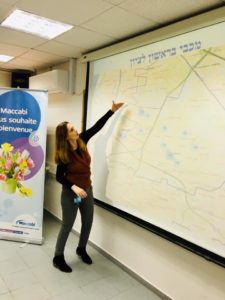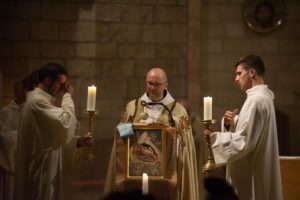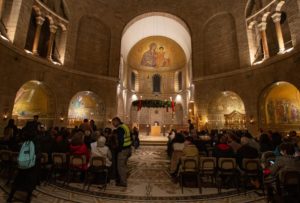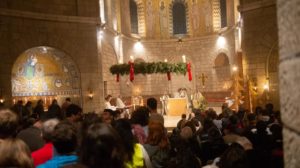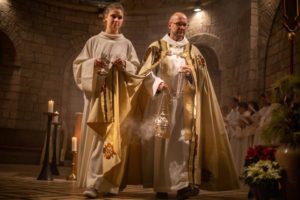JICC and Jerusalem Foundation in Der Welt Newspaper
We are proud of our accomplishments throughout the city, and especially proud of our accomplishments over the past few years here at our home on Mount Zion (You can read more here). An article was recently published in Der Welt, a nationally published German newspaper, about this. Here’s the original article in German, and here’s a translation:
Today, We No Longer Fight about Parking
By Gil Yaron
Mount Zion in Jerusalem is sacred to Jews, Christians and Muslims – for centuries they have been neglected as neighbors. A group of activists could now resolve this dispute, and thus become a role model for all of Jerusalem.
As the dean of the ecumenical year of study of German churches on Mount Zion in Jerusalem, Professor Ulrich Winkler usually speaks mostly of charity. But when he looks at the sacred hill right outside the window of his workplace, it reminds him of the opposite of the Christian message: “If at some point the third world war broke out, it would be because of a dispute over parking here on Mount Zion,” says the former Salzburg resident.
He used to be forced to run out in pajamas in the middle of the night, when there had once again been bickering between Christians, Jews and Muslims outside the gates of the school .
And that was not the only type of dispute that was part of everyday life here: “Garbage was thrown into the garden, our doorknobs were smeared with feces,” says Winkler. Other times car tires were punctured, priests and students harassed. But now much of these tensions have become a thing of the past, thanks to the energetic efforts of a small group of Israelis who have set themselves the task of mediating between the people in the Holy City. It has been surprisingly successful.
“When we moved here in 2006, we ourselves were very scared of this mountain,” says Dr. Hagai Agmon-Snir, director and founder of the Jerusalem Intercultural Center on Mount Zion. “All the neighbors here were neglected for centuries. Anyone who interfered threatened to become the target of hostility. ”
Hardly a hill of Jerusalem – with the exception of the Temple Mount – is more controversial than Mount Zion. As early as the 4th century, the Mount housed a Byzantine church or synagogue, which after the conquest of the Holy Land in the 7th century was transformed into a mosque by Muslims. The Crusaders again made it a church and declared the feudal room on the first floor to be the place where Jesus is said to have taken his last supper – the Cenacle.
At the same time, they located the tomb of the legendary biblical King David on the ground floor, transforming it into a sanctuary of the three monotheistic religions.
The Ottoman Sultan Suleiman the Magnificent expelled the monks in 1524 from the building, which from then on served as a mosque. It was administered by the mighty Dajani family, long-established Jerusalem Arabs who can trace their family tree back to the grandson of the Prophet Muhammad.
When the State of Israel was proclaimed in 1948 , the mosque became a synagogue. The supposed grave of King David became the holiest place in the Jewish state, which was cut off from the Temple Mount and Wailing Wall until 1967.
Today, four different churches and monasteries, a huge Yeshiva, a Holocaust museum and a Muslim cemetery are struggling to help shape the narrative of this mountain.
The tensions reached a climax a few years ago: graves were abused, graffiti attacks became an almost weekly incident. This ultimately spurred Agmon-Snir and his crew to take action. They organized a gathering of all inhabitants of Mount Zion: “There had never been anything like that before,” says Snir.
Islamists and settlers together
In fact, it was in the garden of the Jerusalem Intercultural Center where all the parties came together. It was actually an advantage that Greek Orthodox monks, German priests, Armenians, Arabs and Torah students do not speak a common language: “If everything has to be translated endlessly, that reduces the communication to the necessary minimum. So there was barely any dispute and it was very efficient, “smiles Snir.
Why could he succeed where others failed so far? “We only deal with everyday problems that all stakeholders are interested in solving,” says Agmon-Snir. As a non-governmental organization funded by the Jerusalem Foundation and donations, Snir represents a credible apolitical agenda: “We can work with all city dwellers,” says the former neurobiologist.
The radical Islamic Hamas and militant Israeli nationalists have different, mutually exclusive visions about the future of Jerusalem. “But when it comes to clearing the garbage, fighting noise, or repairing roads, we sometimes bring Islamists and settlers together, and they cooperate,” says Snir.
The dialogue operated by the Center is now beginning to see clear benefits: “There has been no incident on Mount Zion for a long time,” confirms Brother Matthias of the Dormition Abbey. For the last three years, the Yeshiva students helped clean and repair Muslim and Christian cemeteries. All the organizations and neighbors on the mountain jointly condemned violent attacks when they occurred.
Once, special ceremonies used to cause real problems. On Easter, a special staircase is opened for the Greek Orthodox Patriarch, so that he can descend from the Cenacle to David’s Tomb. At the same time, Orthodox Jews used to protest loudly, calling it an attempt to desecrate their sanctuary or even take it away. In the past two years, however, it remained calm, and there were no incidents: “If you know each other personally, the provocation sometimes loses its legitimacy,” explains Snir.
It does not mean that everything is rosy: “Many still spit on the floor when they see a procession with a cross on the way to the Church of the Holy Sepulcher,” says Matthias.
Someone filed a complaint against his monastery after a rumor circulated that the monks secretly dug tunnels to David’s Tomb. The police, the city council, the antiquities authority and the park authority were then all forced to search the abbey to investigate the complaint. “But we have nothing to hide,” says Brother Matthias.
And yet Winkler says, “The Jerusalem Intercultural Center has proved to be the most beneficial organization here.” Thanks to the dialogue, he and the director of the Yeshiva finally greet each other in the street, instead of ignoring each other with suspicion. And recently, no more parking spaces are quarreled over in front of his office at night. In fact, the Center, together with all Mount Zion neighbors, has made it possible for a barrier to be installed that provides access only to residents – a simple, jointly conceived practical solution to a decade-old problem.
The successful de-escalation on the mountain has led Agmon-Snir to help groups in other parts of Jerusalem reduce tensions. Ironically, the embattled Mount Zion is a model for the whole Jerusalem conflict.
Many thanks to the Jerusalem Foundation for its continued strategic partnership over the years.

